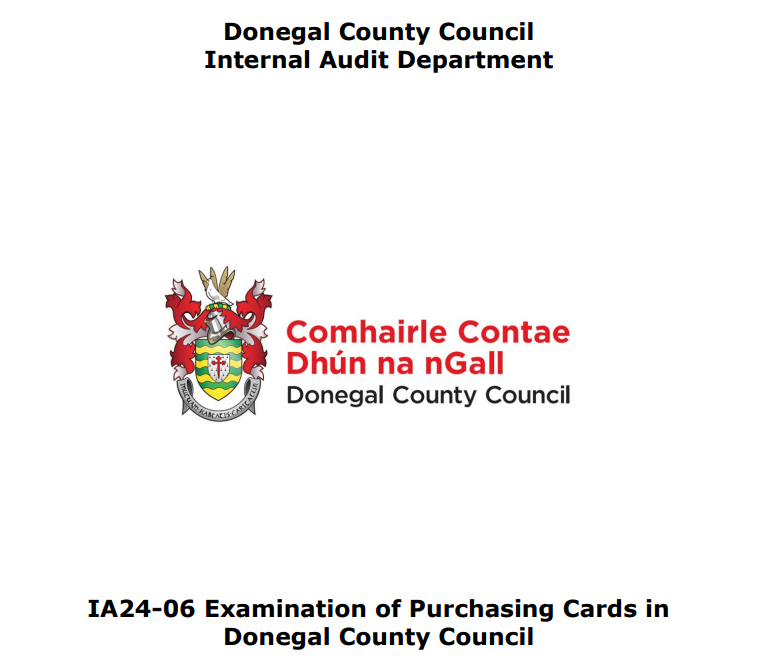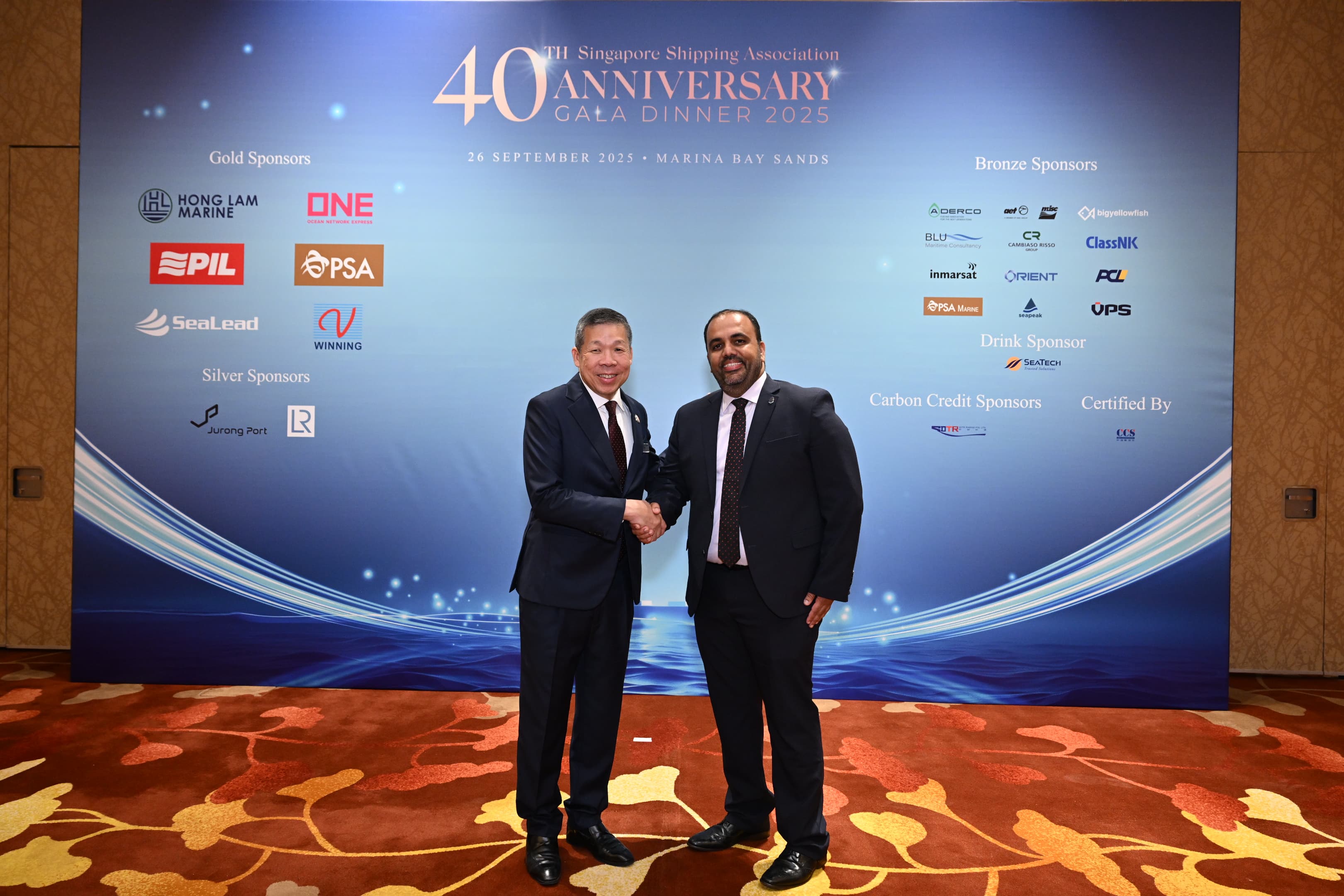By highlandnews,Purchase Card
Copyright highlandradio

Donegal County Council has been told there was no wrongdoing identified in a recent review of spending on council purchase cards.
Chief Executive John McLaughlin said sampled expenditure was found to be legitimately required for Council business, and within approved budgets.
The review made a certain number of recommendations which the Chief Executive said are being implemented.
He also stressed that all transactions have been reconciled.
Cllr Gary Doherty says cards are necessary, but it’s vital that what could be perceived as ‘sloppy practices’ are nipped in the bud………….
Cllr Michael Naughton says it’s important that members, staff, and the general public can have confidence that the system isn’t being abused, and with that in mind, it’s important that clarity was provided at this week’s council meeting…………..
***********************************
Full document as presented to members –
Re: Internal Audit Report on the use of Purchasing Cards in Donegal County Council
1.0 – Introduction
1.1 An Internal Audit report on the Council’s use of Purchasing Cards was published on the
Council’s website in May 2025. It is Donegal County Council practice that all completed
Internal Audit reports are published online. This is done in the interests of transparency and
accountability.
1.2 Further to commentary in the press and on radio during August, it has become necessary to
provide this report to Council. This should be useful in terms of background and context.
1.3 It is important to note that the Council was not afforded a right-of-response prior to the
publication of a press article on this topic recently. As a result, commentary on the issue was
not balanced and did not provide a fair assessment of the use of Purchasing Cards in the
context of the efficient delivery of Council services.
1.4 The Council uses Purchasing Cards as part of the efficient management of Council business.
For context, the Council spent almost €390m in 2024. Expenditure on Purchasing Cards was
in the sum of €1,582,596.32 which is approximately 0.4% of total Council expenditure.
1.5 Importantly, the Internal Auditor found no evidence of financial wrongdoing. There was no
evidence that purchases made by Purchase Card were not required.
2.0 – Background to Internal Audit Function
2.1 As the title suggests, Internal Audit is an internal function of the Council tasked with
reviewing Council functions and making recommendations for improvement. The Internal
Auditor is a Council staff member.
2.2 As a matter of course, and in the interest of transparency, all Internal Audits are published on
the Council’s website (there are around a dozen reports online at present). Anyone can
access these online.
2.3 Each audit report provides management responses to the issues raised by the Internal
Auditor. The responses contextualize the findings and outline how management intends to
remedy any shortcomings. (In the case of the audit on Purchasing Cards, only the auditor’s
findings have been highlighted in the press article. None of the management responses has
been referenced or acknowledged. The Council was not afforded an opportunity to comment
prior to the publication of the press article).
2.4 Each Internal Audit Report is reviewed by the Council’s Senior Management Team and by the
Council’s Audit & Risk Committee (prior to being published online).
2.5 All completed Internal Audit Reports are provided to the (external and independent) Local
Government Auditor as a matter of course.
3.0 – Overview on Purchasing Cards
3.1 Purchasing Cards are an efficient way of doing business for the Council. Council workers
requiring, for example, materials to repair houses or on roads jobs, can purchase low-value
goods and services without the need for excess paperwork. It could take several days to
order and pay for goods/services through other channels (i.e., raising and approving a
requisition in the office, issuing a purchase order, waiting for an invoice to be issued, and
arranging for a payment to issue through the Council’s bank as part of weekly pay runs).
Purchasing Cards are a modern way of working and are in common use throughout the
developed world.
3.2 In a nutshell, Purchasing Cards provide users with a more flexible and immediate method of
executing low-value, high-frequency purchases. There is an argument for Purchasing Cards
being used more often as overhead costs are significantly lower.
3.3 Around 250 members of staff have a Purchasing Card. For the eight-month period January to
August 2024, there were 7,203 transactions accounting for a spend value of €991,067.
Average expenditure per transaction was €138. The vast majority of these transactions occur
in local shops/businesses, which is good for the County’s economy.
3.4 No Elected Members have a Purchasing Card (as they would not have a role in making
purchases for the Council).
3.5 Staff who use Purchasing Cards frequently include: Housing Maintenance Staff, Roads
Workers, Water Services Staff, etc.
3.6 The categories of spend include: Electrical Materials, Plumbing Materials, Water Fittings,
Cement, Pipes, Manhole covers, Timber, Paint, Central Heating Fittings, Maintenance Costs
for Council Vehicles, Hire of Skips, Flights, Toll Charges, and so on.
3.7 A real-world example: Housing Maintenance Programme – a member of staff requires
materials available on the day to carry out repairs to a house
(doors/windows/fences/electrical/etc.), rather than waiting days for ordering materials
through the office. There are many others.
3.8 Purchasing Cards can be particularly effective during emergency circumstances (e.g., flooding
or storm events), where materials/services are required immediately by staff on the ground
during evenings or weekends when offices are shut.
4.0 – Findings of the Internal Audit Report
4.1 To reiterate, no evidence was found that purchases were not required. Sampled expenditure
was found to be legitimately required for Council business and was within approved budgets.
There was no evidence whatsoever of financial wrongdoing.
4.2 The findings revolve mainly around proper discipline and a requirement that processes be
improved. This includes the timely uploading of legible receipts to the Council’s Purchasing
Card database and the accurate recording of transactions on the Council Financial
Management System. These are simple administrative exercises, but they are important and
must be followed.
4.3 The daily transaction limit is €700. The monthly transaction limit is €3,500. 79 breaches were
identified during the 8-month period under review (around 1% of all transactions). In many
cases, these can be justified in individual circumstances (example in next bullet point).
4.4 Software purchases are generally prohibited under Purchase Card guidelines. However, as an
example, there is one instance where proprietary software is purchased from the US (at a
cost in excess of the single transaction limit), where there is no other supplier or acceptable
payment method. Despite being a software purchase that exceeds the single/monthly
transaction limit and is supplied from outside the State, this expense is justified and formally
4.5 Purchasing Cards have been used for Travel & Subsistence Expenses (e.g., booking flights
online, paying toll charges, etc.). This is currently prohibited under policy, but this needs to
be reviewed. It is likely that the policy review will allow such payments in future, in the
interests of efficiency and practicality.
4.6 The audit found that some purchased items should have been obtained through Central
Stores, rather than in shops around the County. This is something that needs to be tightened
up. However, being able to obtain essential materials quickly is often a factor. There was no
evidence that these purchases were not required. However, under the guidelines, they
should have been procured through Central Stores.
4.7 The foregoing real-world examples demonstrate the need for the usage policy on Purchasing
Cards to be updated. Once the policy has been updated, it is likely that many transactions
currently deemed to be in-breach will fall within acceptable policy.
4.8 Council Management will work on improving discipline/practices and updating policy, in
recognition of the findings of the internal audit.
5.0 – Conclusion
5.1 Every single purchase made using Purchasing Cards requires the approval of a line manager
within the Council’s management structure.
5.2 All Purchase Card transactions are recorded and managed within a bespoke database system
designed specifically to manage Purchasing Card transactions.
5.3 All unreconciled transactions at year-end have since been reconciled. They were reconciled
in advance of the Council producing its statutory annual financial statements. Transactions
are reconciled on a rolling basis periodically throughout the financial year.
5.4 The Council’s policy on the use of Purchasing Cards is several years out of date. The updating
and modernising of the policy will widen the scope of the transactions that are allowable, in
recognition of the contemporary business environment.
5.5 Council management is satisfied with the use of Purchasing Cards as a means of doing
Council business and will be encouraging increased use of Purchasing Cards where
appropriate to continue to deliver effective and efficient services to the public.
The published Internal Audit report can be accessed at the following link:
https://www.donegalcoco.ie/media/iypb5zp5/ia24-06-examination-of-purchasing-cards-in-dcc-finalreport-for-publication.pdf



